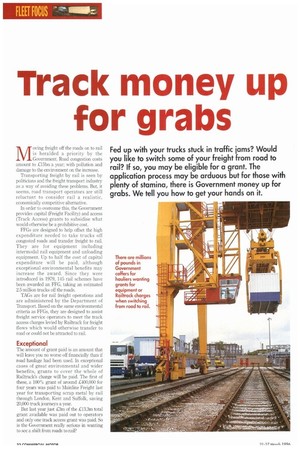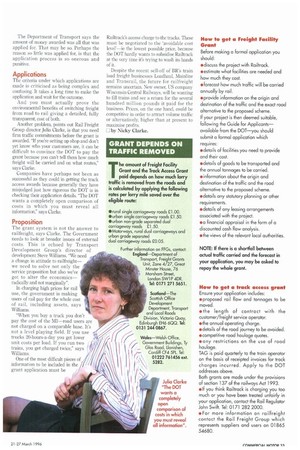Track money up for grabs
Page 34

Page 35

If you've noticed an error in this article please click here to report it so we can fix it.
Moving freight off the roads on to rail is heralded a priority by the Government. Road congestion costs amount to Ll5bn a year; with pollution and damage to the environment on the increase.
Transporting freight by rail is seen by politicians and the freight transport industry as a way of avoiding these problems. But, it seems, road transport operators are still reluctant to consider rail a realistic, economically competitive alternative.
In order to overcome this, the Government provides capital (Freight Facility) and access (Track Access) grants to subsidise what would otherwise be a prohibitive cost.
FFGs are designed to help offset the high expenditure needed to take trucks off congested roads and transfer freight to rail. They are for equipment including intermodal rail equipment and unloading equipment. Up to half the cost of capital expenditure will be paid, although exceptional environmental benefits may increase the award. Since they were introduced in 1979, 145 rail schemes have been awarded an FFG, taking an estimated 2.5 million trucks off the math TAGs are for rail freight operations and are administered by the Department of Transport. Based on the same environmental criteria as FFGs, they are designed to assist freight service operators to meet the track access charges levied by Railtrack for freight flows which would otherwise transfer to road or could not be attracted to rail.
The amount of grant paid is an amount that will leave you no worse off financially than if road haulage had been used. In exceptional cases of great environmental and wider benefits, grants to cover the whole of Railtrack's charge will be paid. The first of these, a 100% grant of around £400,000 for four years was paid to Mainline Freight last year for transporting scrap metal by rail through London, Kent and Suffolk, saving 20,000 truck journeys a year.
But last year just Om of the £13.3m total grant available was paid out to operators and only one track access grant was paid. So is the Government really serious in wanting to see a shift from roads to rail? The Department of Transport says the amount of money awarded was all that was applied for. That may be so. Perhaps the reason so little was applied for, is that the application process is so onerous and punitive.
The criteria under which applications are made is criticised as being complex and confusing. It takes a long time to make the application and wait for the outcome.
And you must actually prove the environmental benefits of switching freight from road to rail giving a detailed, fully transparent, cost of both.
Another problem, points out Rail Freight Group director Julia Clarke, is that you need firm traffic cominitments before the grant is awarded. "If you're setting up shop and don't yet know who your customers are, it can be difficult to convince the DOT to pay the grant because you can't tell them how much freight will be carried and on what routes," says Clarke.
Companies have perhaps not been as successful as they could in getting the track access awards because generally they have misjudged just how rigorous the DOT is in checking their application details. "The DOT wants a completely open comparison of costs in which you must reveal all information," says Clarke.
The grant system is not the answer to railfreight, says Clarke. The Government needs to look at broader issues of external costs. This is echoed by Transport Development Group's director of development Steve Williams. "We need a change in attitude to railfreightwe need to solve not only the service proposition but also we've got to alter the economics— radically and not marginally".
In charging high prices for rail use, the government is making users of rail pay for the whole cost of rail, including assets, says "When you buy a truck you don't pay the cost of the Ml—road users are not charged on a comparable base. It's not a level playing field. If you use trucks 20-hours-a-day you get lower unit costs per load. If you run two trains, you get charged twice," says Williams.
One of the most difficult pieces of information to be included in the grant application must be Railtrack's access charge to the tracks. These must be negotiated to the 'avoidable cost level'—ie the lowest possible price, because the DOT hardly wants to subsidise Railtrack at the very time it's trying to wash its hands of it.
Despite the recent sell-off of BR's train load freight businesses Loadhaul, Mainline and Transrail, the future for railfreight remains uncertain. New owner, US company Wisconsin Central Railways, will be wanting to fill trains and see a return for the several hundred million pounds it paid for the business. Prices, on the one hand, could be competitive in order to atn-act volume traffic or alternatively, higher than at present to maximise profits.
by Nielcy Clarke.
















































































































